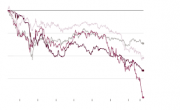Where's the Emerging Market Oil Dividend?
Barron’s, May 14, 2016
Low oil prices are obviously bad for some emerging markets, such as Russia and Brazil. But they should be good for most of them, including India and China. Crude exporters represent just 20% of the global MSCI Emerging Markets Index, says Marcus Svedberg, chief economist at East Capital in Stockholm.
Markets have ignored this logic, however. Emerging market indexes have plummeted since the great oil crash began in mid-2014, and only started to recover as crude prices rebounded recently. Analysts who waited on an oil dividend for the developing world are giving up hope. “If you haven’t seen it for more than 20 months, you probably won’t see it now,” says John Baffes, who oversees the World Bank’s commodities forecasting. Here’s why:








